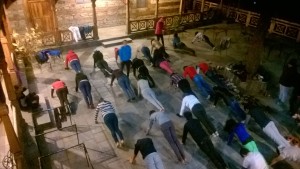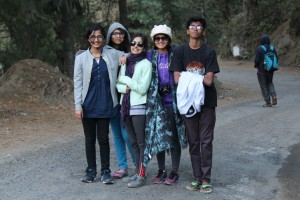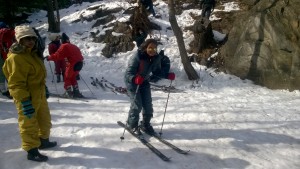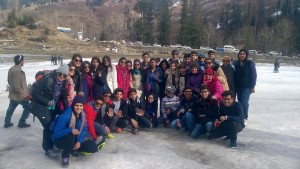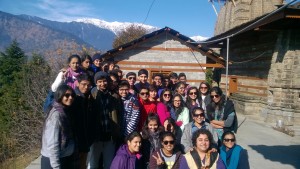Naggar – The Capital of Kullu
After struggling for a long while to decide a place that we could enjoy in the winter season – Naggar was finalized as our Grade 11 CAS trip.
Exploring Naggar on foot
A lot of new information about Naggar was told us while we trekked in the morning and afternoon, on the first day. The one information that stuck with me throughout the day was the changing scenario of the village – which was told to us by the local guide. Villagers’ way of living has drastically changed over time and also about the recent human impact on the ecology.
In the evening, we also did yoga. Even though I am not fond of doing Yoga, I tried it and learned about its benefits and reasons behind it.
We were explained about the consequences of littering and harm that we might cause to this beautiful place. Nobody was going to watch us all time, and it is all about how true our morals are for us to not dirty this place. How ethical is it for us to visit a place and leave it worse off than before?
A walk to Rumsu Village
We were informed about the customs and tradition of that village. We also got to know about the way devtas (Hindu gods) that come there every season and possess few seniors of the village, and then they answer any questions that are asked to them. This information fascinated me, the way people get possessed and can answer any question you ask them, villagers have the faith that the answers will be true.
We had a walk planned for the afternoon which wasn’t compulsory for all. The morning trek to Rumsu had been tiring and the reason for having this walk was to prevent the muscles from getting rigid, and hence, out of all the people, I was one of the few who chose to go for the walk. This walk was the most beautiful and the best walk of the entire trip. The serenity and the sunlight pouring through the long pine trees was scenic. I learned that the mountains are all covered with tall pine trees although the pines are of no use to humans nor animals, except the birds that nest on them. I realised that adventure comes with responsibility. What we do and leave behind will affect the people living there and the ecosystem.
Gulaba
For the first time, I skied in Gulaba. I wasn’t able to stand wearing skies without someone constantly helping me. It was a great, exciting experience. We had a fun story session in the night where we heard about insane and epic incidents of members from previous tours. We were also told about Gujjars, a semi-nomadic tribe in the Himalayas.
Solang, Vashishth and Manali
That day, we walked around the Solang valley and understood the gradual change (living status) it has gone through in time and about the regulations banning adventures activities (paragliding) for safety norms. I did two adventure activities – A ride in ATV(All-Terrain Vehicle) for each student and Tubing (slide down a snow slope in a big tube). Then we visited another place Vashishth, which is famous for the occurrence of natural hot springs. While experiencing the hot water of the springs, we were told about the history of the hot springs, the adjoining temples and the new construction of cement-based houses.
Exploring Thava
We went for a walk to Thava, an ancient city above Naggar, completely destroyed by an earthquake. Only surviving structure is the famous Krishna temple. Reached there after a short and tiring uphill trek. Explained to us about the temple, its significance and the prominent tilt that was caused by the Earthquake. A story session was conducted in the temple courtyard. Met the resident Pujari of the temple, as well. On special request, the castle’s cooks made local delicacies, called dham, for lunch.
Return Journey
Rejuvenated by the beauty and serenity of the Himalayas, we headed back to the our city, Surat, excited to talk about our experiences to the ones that missed this fantastic trip. ____________________________________________________________________________________

